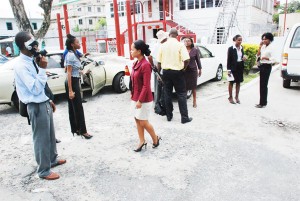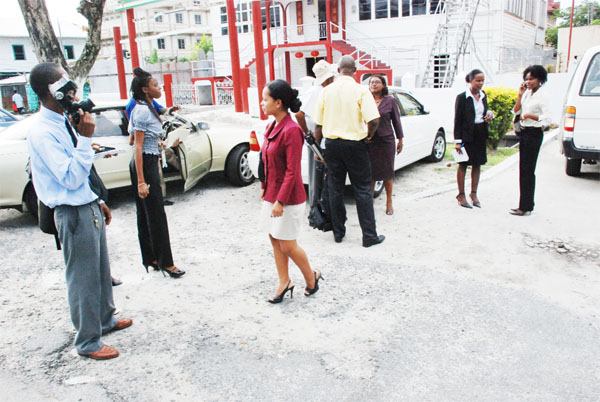GPA stages walkout from ministry briefing
The Guyana Press Association (GPA) yesterday took its first action against the banning of Capitol News reporter Gordon Moseley by questioning UNESCO Consultant Alton Grizzle about it before walking out of an assignment at the Ministry of Home Affairs.

Led by GPA President Denis Chabrol, many media workers turned up for the assignment which was originally to be a joint media briefing hosted by Grizzle and Minister of Home Affairs Clement Rohee. However, after waiting for almost 45 minutes the media was informed by the ministry’s Permanent Secretary Angela Johnson that Rohee was attending an important meeting at the Office of the President (OP) and was unable to attend the briefing.
After opening remarks by Grizzle and Secretary-General at the local UNESCO office, Inge Nathoo, the floor was opened for questioning and barring one question, all the questions posed concerned the banning of Moseley. Grizzle said that from a Caribbean perspective there has been no real issue on press freedom. However, Nathoo refused to comment on the grounds that the banning was not the purpose for convening the briefing. At this point, most workers from private media houses walked out.

Moseley has since refused to apologise saying that he would not allow anyone to “waste his time.” He has also questioned what accreditation GINA was withdrawing since he said no accreditation had ever been given to him or any media worker for OP and State House. The only accreditation GINA has issued to the media is a press pass that gives journalists permission to go past police cordons.
In a statement last night the GPA welcomed on board several media houses who have signalled their support for a number of activities to protest the ban. “The GPA has received commitments from Stabroek News, Guyana Times, Kaieteur News, Capitol News, Evening News, CNS TV6, GWTV News 2, HBTV Channel 9, and Prime News, among others, to engage in a range of activities designed to send a very strong and clear signal to the administration that we shall not allow our rights to be trampled upon,” the statement said. The GPA also noted that several ministerial engagements with the media, including a briefing on Carifesta X by Culture Minister, Dr Frank Anthony, were yesterday aborted, “fearing a boycott or any of the other activities planned by the media.”
The Association said too it has been advised that Moseley’s position that he is “truly fed up with the President and his office’s constant attacks on the private media, especially Capitol News,” is not disparaging and disrespectful. “Based on this advice, thus far, we do not see the need for any apology in this matter, even as we remain hopeful of an amicable resolution by the unconditional lifting of the ban,” it said.
“We do not believe that, at this juncture of our evolving democracy, that media workers and indeed any Guyanese should be beneficiaries and victims of Media Freedom and Freedom of Expression.” This approach is tantamount to a smokescreen to utilize freely expressed views by journalists and Guyanese in general to vilify them and declare them enemies of the state, the GPA said. It said too in this instance Moseley defended himself against President Bharrat Jagdeo’s criticisms of a report on a meeting the latter had held with Guyanese in Antigua earlier this month.
Meanwhile, the Association of Caribbean Media Workers (ACM) and Reporters Without Borders have both issued strong statements criticising the ban. The latter condemned what they termed “the government’s discriminatory decision on 13 July to declare TV reporter and producer Gordon Moseley persona non grata in the office of the president.” It said it supports the GPA’s efforts to resolve the conflict as soon as possible.
“Barring a journalist because a report displeased the president is an attack on pluralism and the press’s critical role,” it said, adding that the government had already resorted to such methods “when it banned the Stabroek News daily from receiving state advertising from November 2006 to April 2008. The punishment impos-ed on Moseley directly affects his ability to work and we therefore call for it to be lifted.”
The ACM also denounced the decision to ban Moseley and called on OP to reverse its decision. It said too there “have also been outrageous assertions regarding the outputs of Capitol News, a regional news agency and a state television operator from another country.”
The ACM said it is not “an encouraging signal” from the Jagdeo administration “which certainly reserves the right to comment critically on the work of the media, but whose intervention in this matter betrays a lack of appreciation of the need to assure the unfettered rights of journalists to do their work.” (Oluatoyin Alleyne)






